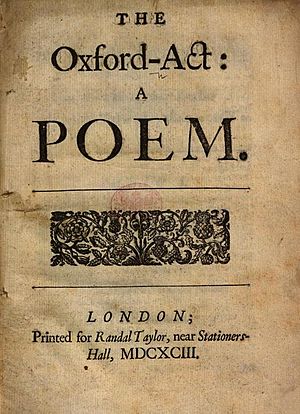Alicia D'Anvers facts for kids
Quick facts for kids
Alicia D'Anvers
|
|
|---|---|

Title page, Alicia D'Anvers, The Oxford Act (1693) (Google Books)
|
|
| Born | Alicia Clarke 1668 Oxford |
| Died | 1725 (aged 56–57) |
| Resting place | Holywell, Oxford |
| Occupation | writer |
| Language | English |
| Nationality | English |
| Notable work | Academia, or, The Humours of the University of Oxford |
| Spouse | Knightley D'Anvers |
| Relatives | Samuel Clarke (father) |
|
|
|
Alicia D'Anvers (born Alicia Clarke, around 1668–1725) was an English poet. She is best known for her funny poems that made fun of, or satirized, life at universities.
Contents
Discovering Alicia D'Anvers' Life
Alicia D'Anvers was born in Oxford, England. Her father, Samuel Clarke, had an important job at the University of Oxford. He was a "beadle," which was like a university officer. He was also the first "architypographus," meaning he was in charge of printing for the university. Sadly, her father passed away when Alicia was only two years old.
In 1688, Alicia married Knightley D'Anvers, who was a "barrister" (a type of lawyer). Alicia and Knightley did not have any children.
Her Published Poems
Alicia D'Anvers published at least two poems. A third poem is also thought to be hers.
Her first known poem was A Poem Upon His Sacred Majesty, His Voyage For Holland: By way of Dialogue, Between Belgia and Britannia (1691). This poem was written for Queen Mary. It was a conversation between two characters: Britannia (representing Britain) and Belgia (representing the Netherlands). The poem talked about King William III. Some people wondered if he cared more about his home country, the Netherlands, than Britain. Alicia's poem explored these ideas. Some people thought the poem was a bit boring, but others said it was quite brave for its time because it discussed political topics.
Her next two poems were Academia, or, The Humours of the University of Oxford. In Burlesque Verse (1691) and The Oxford-Act: a Poem (1693). These poems were written in a "burlesque" style. This means they made fun of serious subjects by treating them in a silly or exaggerated way. These poems made fun of parts of university life at the University of Oxford. It was unusual for women to write this type of university satire back then.
Academia: A Popular Satire
Academia, or, The Humours of the University of Oxford was Alicia D'Anvers' most popular poem. It tells the story from the point of view of a town servant. The poem makes fun of the university through the eyes of a visitor from the countryside named John Blunder. He's a bit of a "country bumpkin" (someone who is not used to city life). The poem is quite long, with 1,411 lines. It uses a lively, everyday language and a specific poetic rhythm called "hudibrastics."
Some people have called Alicia D'Anvers a "splendid Oxford satirist." However, others have described Academia as "ribald, scurrilous doggerel," meaning they thought it was rude and poorly written. Despite different opinions, her work has been included in important collections of poetry, like Kissing the Rod (1988) and Early Modern Women Poets.
Alicia D'Anvers' Works
- A Poem Upon His Sacred Majesty, His Voyage For Holland: By way of Dialogue, Between Belgia and Britannia. London, Printed for Tho. Bever, at the Hand and Star, near Temple Barr, in Fleet-street, 1691.
- Academia, or, The Humours of the University of Oxford. In Burlesque Verse. London: Printed and sold by Randal Taylor near Stationers Hall, 1691 (reprinted in 1716, 1730).
- The Oxford-Act: a Poem. London: Printed for Randal Taylor, 1693.
See Also
- Campus novel
- List of satirists and satires
- School and university in literature
 | William M. Jackson |
 | Juan E. Gilbert |
 | Neil deGrasse Tyson |

